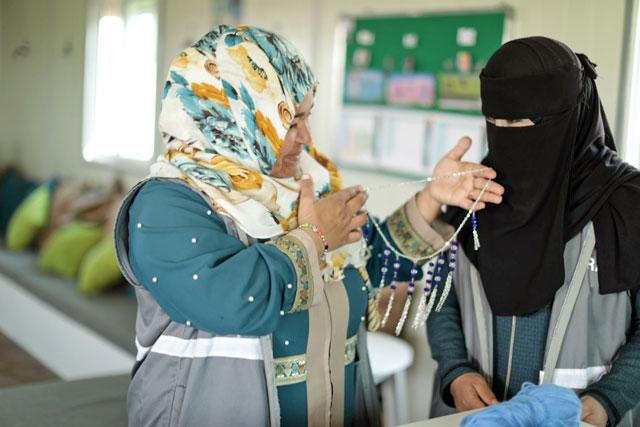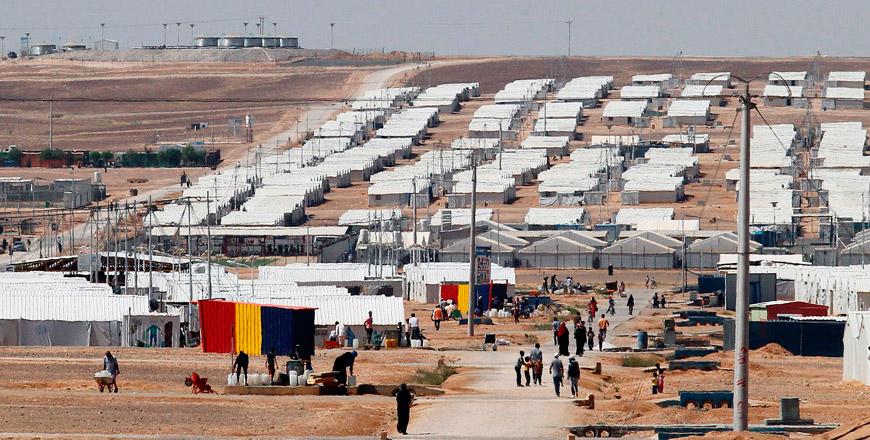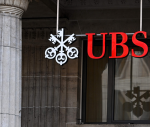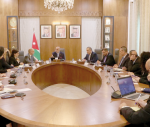You are here
Study calls for opening marketplace at Azraq camp
By Dana Al Emam - Jun 30,2015 - Last updated at Jun 30,2015

Syrians recently shop at an outlet at the Azraq Refugee Camp, some 100km east of Amman and 20km west of the town of Azraq in Zarqa Governorate (Photo by Muath Freij)
AMMAN — Opening a marketplace at the Azraq Refugee Camp is key for honing Syrians’ skills and improving their livelihoods, according to a CARE and Silatech assessment issued on Tuesday.
The assessment cites a “very high” demand for work among camp residents and suggests that skilled refugees and those seeking to develop a skill could benefit from a marketplace as an income opportunity that responds to the needs of the camp community.
Azraq camp, some 100km east of Amman and 20km west of the town of Azraq in Zarqa Governorate, hosts more than 19,000 Syrian refugees, over half of whom are under 18, while around 45 per cent are of working age (18-59 years), according to the assessment.
Currently, camp residents can only buy their urgent food needs with a monthly allowance of JD20 per person through the World Food Programme distribution point at Sameh Mall, the only market at the camp that sells food at prices said to be “too high”.
The projected marketplace could feature trading, farming, carpentry, food production, teaching and hairdressing outlets, according to the study, which was conducted during May and June this year.
Based on some 200 individual and household interviews and focus group discussions engaging over 100 participants, the assessment lists more and better quality food, as well as water and medical services, as the top three most needed commodities for camp residents.
The assessment also features an “in-depth” review of the camp’s livelihood programme, known as the incentive-based volunteering (IBV) scheme, which is the only mechanism in the camp for registering job seekers, facilitating recruitment and tracking the status of their placement in IBV opportunities.
“This livelihoods programme is a major step in creating opportunities where refugees can offer their skills or develop new ones,” CARE Jordan Country Director Salam Kanaan said, adding that the IBV scheme has injected over $1 million into the camp’s economy.
Furthermore, the market would function as a catalyst for the potential and skills of refugees and encourage the creation of enterprises, noted Fairuz Taqi-Eddin, Silatech’s director of country operations.
“Markets bring life and livelihood opportunities to any setting… Silatech’s work in the enterprise space has proven to us the positive change that enterprises can bring to the economic status of individuals and families, while creating job opportunities for others,” she noted.
As the average duration of living in refuge is 17 years, Taqi-Eddin highlighted the need to enable camp residents to independently support themselves, as aid delivered to them is not sustainable.
The study lists trading, farming and carpentry as the top skills for males, while those for females are mostly in food production, tailoring and farming.
With 40-70 new Syrian refugees entering the camp daily, the market becomes of “great” significance to respond to residents’ needs, CARE Azraq Camp Team Leader Marten Mylius said.
Out of some 4,500 individuals registered as job seekers with the IBV scheme, only 700 skilled and unskilled camp residents have jobs at the camp.
“It is very clear that refugees’ main desire is to work,” Mylius added, noting that a job is not only a source of income for camp residents, but also a means to acquire skills and build an identity as contributors and not recipients of aid.
Founded in 1945, CARE is a humanitarian organisation fighting global poverty and providing lifesaving assistance in emergencies.
It has been working in Jordan since 1948 and has experience in providing livelihood training and opportunities, emergency cash assistance, information sharing and psychosocial support to Iraqi refugees since 2003.
Founded in 2008 by Qatar’s Sheikha Moza Bint Nasser, Silatech is a regional social initiative that works to create jobs and expand economic opportunities for young Arabs.
Related Articles
AMMAN — For almost half a year, the Women and Girls Safe Space Centre (WGSS) has been operational in Azraq refugee camp.
AMMAN — Thousands of Syrian refugees will be able to light their homes, charge their phones and chill their food by solar power as Jor
AZRAQ REFUGEE CAMP — The International Labour Organisation (ILO) and UNHCR on Sunday opened the first centre for employment at the Azr

















